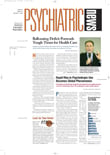Individuals with schizophrenia living in group-home or boardinghouse arrangements are more likely to have low levels of global functioning than those living independently, a new study shows.
Researchers in Queensland, Australia, looked at 3,033 individuals with schizophrenia living on their own and compared them with 201 schizophrenia patients in group homes or boardinghouses. The investigators measured the presence of schizophrenia symptoms with the Health of the National Outcome Scale, while the shortened Life Skills Profile was used to gauge the global level of functioning.
Analysis of the data did not indicate that people with schizophrenia in boardinghouses had more psychiatric symptoms, but rather less opportunity for social support. They also found that overall functioning was lower for people living in boardinghouses; however, they remained interested in making social contact. These results contradict commonly held beliefs in mental health services, according to the authors.
They said that the data support the recovery literature suggesting that social support and stability are important in the maintenance of mental health. The data also support that when mentally ill individuals live with people of their own choice and in accommodations that suit them, they do better on all measures.
In an earlier study the authors found that people with schizophrenia who were discharged to a boardinghouse were far more likely to be rehospitalized than those who had been discharged to their own homes. The authors believe there is an assumption that people with schizophrenia live in boardinghouses because of their level of disability and that this could explain their higher hospital admission rates. If this were true, the data would have shown that people living in boardinghouses had significantly worse psychiatric symptoms, but they did not. It could be argued that a lack of access to a self-selected supportive social network, meaningful activities, and work are the reasons people in boardinghouses are more commonly readmitted. If this is supported, the authors said, it appears that if community health service staff were able to address these issues, it would be possible to lower the costs of readmission while also helping their clients lead more satisfying and meaningful lives.
The authors noted that their research leaves a number of questions unanswered. There is a need for further research that investigates the reasons for readmission and mental health status of people with schizophrenia coming to hospitals from boardinghouses and their own homes. There is also need to investigate further the unexpected results indicating that although there is no symptom difference between the two groups, people in boarding-houses seem to have less opportunity for social support and meaningful activities. Could this lack of social support and meaningful activities have an impact on their mental health, increasing their need for readmission?
They concluded that it seems timely that a study be undertaken to explore the phenomena in an attempt to develop a theoretical explanation of why these differences exist between the groups. Findings from such a study would have far-reaching implications in terms of the focus of care for people with schizophrenia.
